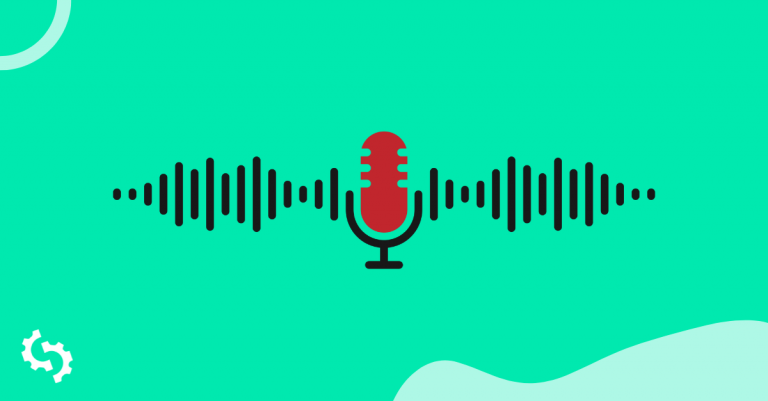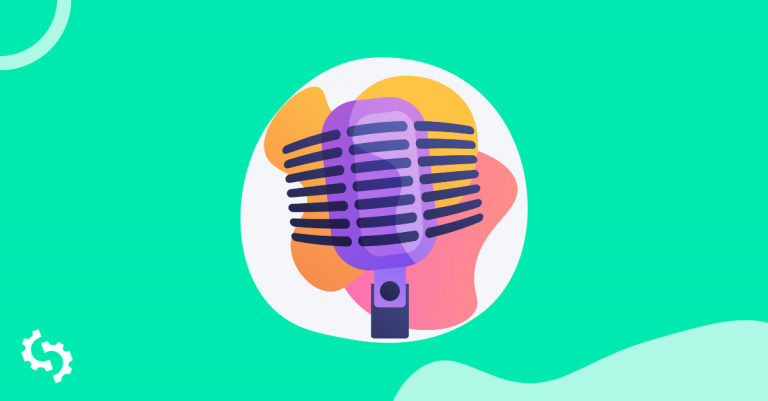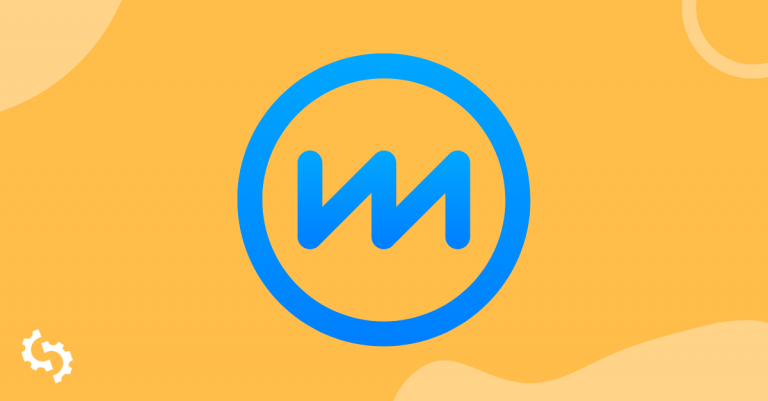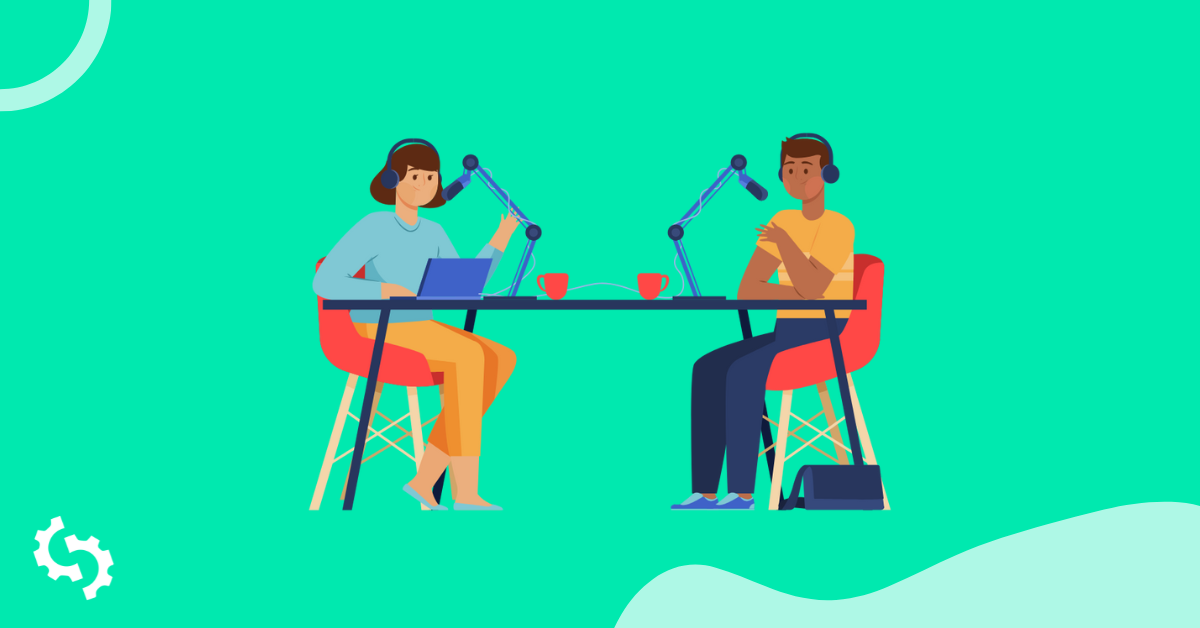
In this episode of the Digital Agency Series Podcast, I chat with Brogan Renshaw, Founder and Director at Firewire Digital based in Newcastle, Australia. After initially starting as a full-service digital agency, Brogan realized a gap in the Newcastle agency market for a dedicated SEO & PPC agency. He soon pivoted the agency to this speciality and has been successfully competing against other agencies in the area who are trying to offer everything.
Listen to the full interview (26mins) on Apple Podcasts or Google Podcasts or jump to the interview transcript.
Interview with Brogan Renshaw from Firewire Digital
I had the pleasure of meeting Brogan, a fellow Aussie who has put the hard yards in over the years to grow a specialist agency, bucking the trend in a city of full-service digital agencies. Originally from Sydney, Brogan and his wife moved north to the idyllic coastal town of Newcastle to buy a house.
After losing his job at a previous agency when the client relationship soured, he took matters into his own hands and embarked on his own agency founder journey. He soon found out the Newcastle agency scene was all full-service. The key question was - could a specialist agency survive in a smaller regional city like Newcastle?
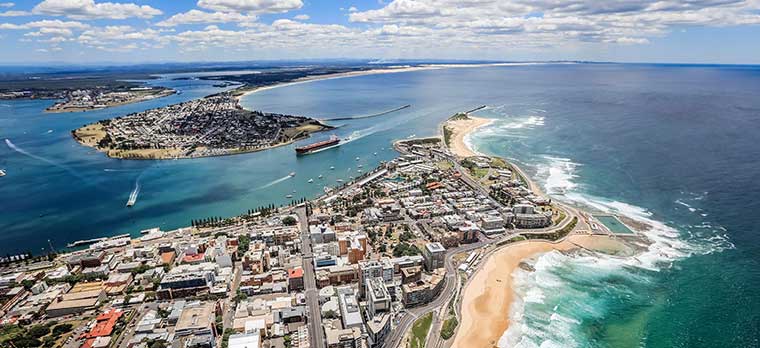
The answer was a resounding 'yes'. Despite the fact that Firewire Digital originally launched as a full-service digital agency, Brogan found his fit not by niching down to an industry or type of client but instead, niching down to a service offering: SEO & PPC.
"We cut so many services out. Not that we were bad at them, it was just that I didn't enjoy them and they took up too much time versus [the fact that] we are so good at SEO, so good at PPC, that we can smash it out so much quicker and get more value for our clients."
Originally Brogan relied on the family business as his first client. But he soon expanded based on family and friend referrals. This proved to him the power of business referrals and laid the groundwork for how he would build his agency around referrals and trust.
"The first year was a slog. You've got limited resources to do the things you want to do."
Like most founders experience, year one was tough. Towards the end of the first year though he read Michael E. Gerber's bestseller, The E Myth Revisited: Why Most Small Businesses Don't Work and What to Do About It. The book was a turning point for Brogan and it changed the way he approached building his agency.
In essence, the book talks about how your passion results in you trying to do everything and you inevitably get trapped in the day-to-day. Eventually, all your energy is taken up simply running the business. You then neglect business development.
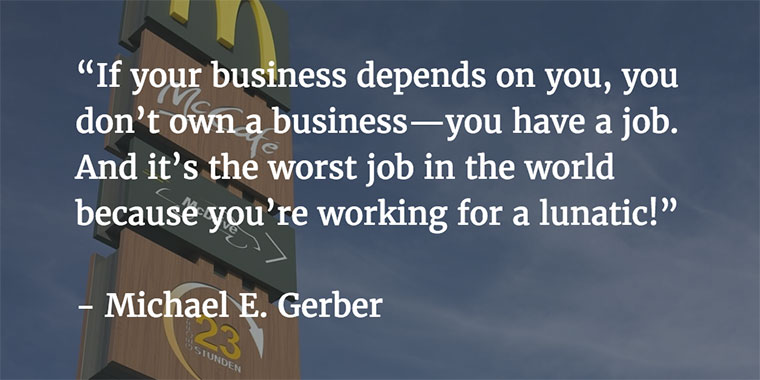
This resonated with Brogan and after reading the book he changed tack and started implementing business development tactics which reaped an immediate result and the business started growing.
"I'm absolutely useless at big networking events. For me, I'm pretty good at talking 1-on-1."
He started by approaching businesses in Newcastle. Originally he approached video production studios or social media agencies. He built relationships with these other businesses who then referred work to him. The key to making this work was to add value up-front and try to find ways to help grow these other businesses. While the process wasn't necessarily formalized, it was more about building strong relationships with other founders.

But 2020 changed all of this. Lockdowns in Australia were implemented in March, and everything went virtual until about July when things started getting back to normal. Despite Australia being relatively lucky with low COVID-19 cases, Brogan and his team are still all working remotely and he believes it will stay this way as his team enjoy the flexibility and he doesn't believe the costs involved in co-location are worth it.
"2020 has been about building processes for staff."
Today, Firewire Digital does no cold outreach, they focus on inbound marketing (content), a bit of PPC and referral clients. Firewire offer a Free Consultation on their website. Typically he does quick website audits for prospective customers and runs through areas for improvement, rather than suggesting fixes to things that are broken or wrong.
"I try not to tell them things they're doing 'wrong' because generally they are the ones working on the site. It's really really important the way you frame the conversion. You've gotta be positive, don't be negative on the client."
We then started getting meta and talking about podcast marketing. We here at SEOptimer are big fans of podcasts ourselves and this was part of the reason for launching our own podcast. Its also the fact that for agencies, podcasts are a fantastic way to connect meaningfully with your target customers.
Funnily enough, Brogan was a previous podcaster himself. Being a football (soccer) fanatic, he previously ran the 'Behind the Game' podcast and recorded nearly 60 episodes interviewing football fans, club CEOs and even World Cup Socceroos (players on Australia's national football team). He was initially interested in finding a podcast about the people who built and fostered the game in Australia but there was nothing around like that. This was the perfect opportunity for him to start it.
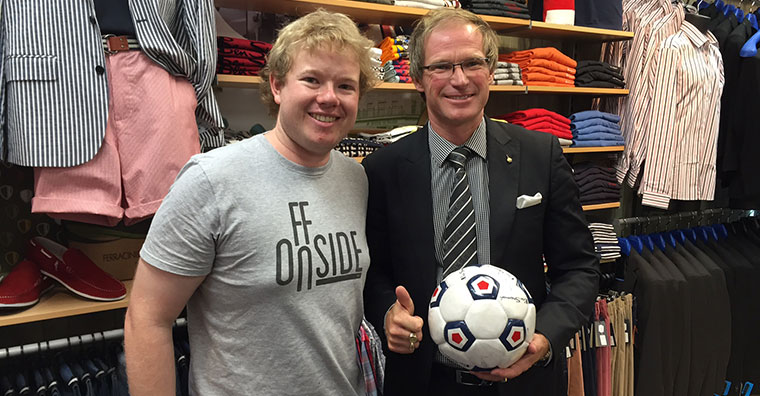
So Brogan knows a thing or two about growing an audience through podcast marketing. His tip for agencies or freelancers looking to start their own podcast:
"You have to think about things differently. The thing about when I did the football podcast - it was a topic that hadn't been done before. There's absolutely no point copying what else is already out there."
Looking to the future, Brogan is launching a new website for the agency in 2021 PLUS he's returning to the mic to start a Firewire Digital podcast. I'll be looking forward to subscribing to that one when it launches!
Digital Agency Resources
We have plenty of guides for how you can start and grow your own digital agency:
- The Simple Guide to Starting an SEO Business
- SEO Report Sample PDF (and Explainer)
- 10 Ideas to Grow Your Digital Marketing Agency in 2021
- The Ultimate Guide to your Digital Marketing Audit (with PPTX Template)
- 15 Step Website Audit Checklist (& PDF Template)
- How to create perfect SEO Reports for Clients
Interview Transcript
Tim: Hey, it's Tim Hill here from the Digital Agency Series podcast, where we meet digital agency founders from all around the world. We find out how they started their agencies, how they grew in the early days and how they scale their businesses today. Digital Agency Series is presented by SEOptimer the world's best SEO audit and reporting tool. Trusted by over 1,500 agencies to automate their SEO audits and generate new business leads. If you haven't tried it, sign up for a free 14-day trial at seoptimer.com. Today, I'm chatting with Brogan Renshaw, director at Firewire Digital, a digital agency based in Newcastle, Australia. Brogan and his team of three specialize in SEO, PPC and website design for clients all around Australia. Well, it's a pleasure that you're joining me today, Brogan, thanks for your time.
Brogan: Thank you for having me.
Tim: We've chatted with a few founders from around the world, so nice to chat to an Aussie.
Brogan: It's wonderful. I did look up a few of your previous ones and did not see an Australian there, so it is wonderful to be the first.
Tim: Yes, yes. It's always good to chat to a local, but the really interesting thing I'm finding is that the challenges that marketers face and agencies face is pretty similar. Like no matter if you're here or indeed on the other side of the world. What are your thoughts on that?
Brogan: Yeah, I think it is one of those things about digital, isn't it? That you are going to face very similar challenges, no matter where you are, purely based on that your whole presence is online. And also like that, I get lots of value out of learning about other agencies. It doesn't matter where they are. So, you do benefit from hearing from others.
Tim: Exactly. And talking about your background specifically - so you used to be client-side and you've got a lot of e-commerce and SEO experience, and you started your agency in 2017. So I'm really interested in what motivated you to step out and do that.
Brogan: I needed a job. That's basically the gist of it. So my wife and I moved from ... my wife's originally from Newcastle and I'm from Sydney and we couldn't afford the housing in Sydney at the time, so we moved up to Newcastle and bought a little house, and I had a job. I got a little job at, it was a casual contract at a small marketing agency. And now, they didn't specialize in digital. It was just a more broad marketing agency. The downside of that is that the owner at the time was ... they had no idea about SEO, which is what I was brought on for. They were the ones that were client-facing. So when their relationship went sour with the client, I was sacked via text message probably about four or five months, it was, and they weren't bringing enough work in to replace client turnover or anything like that.
So basically, I started Firewire because I had a long hard look at, what the hell am I going to do now? And you get sacked. And I just saw that, one, if they can get clients, so could I. If they don't know what they're doing and I do, surely it can't be that hard. Now, looking back at that time, it is definitely not that simple as I made it out in my mind, but it was the right move, but definitely not as simple as just starting Firewire and get clients.
Tim: And I think the thing that's really interesting about that first moment is, you certainly have a lot of thoughts about what the agency can grow into and how you can grow over time. I'm really interested in that first moment though, who was your first client or how did you get them? And what did that first year look like?
Brogan: The first client was pretty easy. It was basically a family business that I cut my teeth in, they just came on board as a proper client. So, that wasn't too bad. The second, third and fourth client were all referrals from friends or businesses that I'd started working with. So, the first year for me, it's a slog, right? Because you've got limited resources to do the things you want to do. So, you want to do your own SEO. You want to be all over social media, you want to do your website design to have the best digital marketing website in your area or for what you're targeting. But you just can't do everything all at once.
A book I read towards the end of the first year was called the E-Myth Revisited. And it basically runs through why most small businesses don't work and what to do about it. This book changed the way I approach working on Firewire. So basically, when you start a business, you're the only person doing everything. So you're working on clients, you're managing the business itself, and you're meant to be the entrepreneur that grows the business. Yet, the thing that falls off is always the entrepreneur, the business development. You end up just managing the business and working on clients, and that's the trap I fell into. And it wasn't until I read this book where it pushed me to dedicate time to business development. And that's when the business actually started to grow properly.
Tim: You contributed to a recent article that we published around agency growth strategies, and you were talking about networking and engaging local community. And I guess that makes sense when you were talking about how word of mouth was very key to you. I'm interested in how that worked pre-pandemic? How did you actually get out and do this kind of business dev in the community? And also what it looks like this year?
Brogan: I, traditionally, before Firewire, I was ... I still am. I'm useless, absolutely useless at, say like a big networking event where there's this a hundred people, there are 200 people there. I am no good at that. I do not have the skills or ability to approach a group of people and introduce myself. I will just hang back. And that's a weakness for me and I recognize that, but I know other people can do that and build business businesses that way. For me, maybe this feeds into what I know we'll talk about later in me starting a podcast a while ago, but I'm pretty good at talking one-on-one. I do enjoy that. And that's not as scary to me as trying to approach a big group.
So I looked at what I could do, and I just started approaching businesses in the area and just saying, "Look, hey, do you want to grab a coffee? ... I'm doing this, you're doing this, let's just chat." Generally, that isn't like cold emailing a client. It's probably a similar business. So think of like a video marketing agency or a pure social marketing agency. And then I approached them and just have a chat, talk to them, see if I can part some kind of wisdom onto them to help their business grow, and they would start to refer their clients back to me.
Tim: I see. So it was actually more about partnerships with those kinds of reciprocal or complimentary service businesses?
Brogan: I haven't ever labelled it as partnerships. It probably technically is. There's never been anything formalized in those things, but it is about building relationships with them and certainly offering some kind of assistance to them as their business. And that's definitely value. Now to the second part of your question about how did that work this year. It was definitely something that got put on the back burner for the main part of say COVID. So you're probably talking to March to July. We were particularly lucky in Australia and New South Wales, particularly that we were essentially allowed to go and meet people and have coffee. So, that was something I continued to do.
Tim: Yeah. When you look at world news, we have to constantly remind ourselves we are in a bit of a bubble here in Australia.
Brogan: Oh, definitely.
Tim: We've gotten away with ... yeah, I guess having a little bit of a less arduous time than many around the world. These days, what does Firewire Digital look like today and what kind of clients do you service?
Brogan: Firewire Digital today is very different to when I started. When I started, I looked at what other businesses were doing in the area and went, "Okay, I'll do all that." And unlike, I'd say more established markets of, say Sydney and Melbourne, where there's a lot of specialty agencies, so there's pure SEO agencies. There's pure PPC agencies. And it's harder to be a full-service agency and do it well, right? Whereas in Newcastle, that's all there is, there's all these just full-service agencies, and that's what I thought I needed to do.
So, Firewire today is more specialized. We cut so many services out. Not that we were bad at them, it was just that I didn't enjoy them and they take up too much time versus we are so good at SEO, so good at PPC, that we can smash it out so much quicker and get more value for our clients. We don't need to charge as much because we can do it quicker. We understand the process. So I'd say that's probably the biggest thing in terms of, it's not necessarily niching down into a certain niche, but it's definitely just culling services that don't provide the value or enjoyment.
We've got four staff, including myself, on now. Which is probably a good size for where we're at right now. Yeah. With COVID, we're all currently still working remotely. So, that's been certainly a challenge to get on board with, but I think it's probably where we're going to stay. I don't necessarily think we need the costs that come with an office and I find my staff enjoy working with more flexibility. I tend to work on ... you have to impart trust, you have to trust the person that they're going to do the work, but that's the biggest thing. To me, I don't mind if they don't work necessarily from nine to five, but if they get the work that I expect in that time, I don't have a problem.
Tim: Absolutely. I think that that idea of delivery over 'clocked hours' is really going to be a big thing post-COVID. Have you found that your workflows and I guess your processes - has there been any changes with how you communicate with your staff or your clients?
Brogan: Oh clients, no. Clients, no because we use a lot of dashboards that they can view at any time that they want to check what we're up to or how progress is going. So that's not too much for clients. For staff, yeah, there's probably a little bit more time that goes into building the processes. Yeah, 2020 for me, has been about building processes for staff. Getting my processes out of my head and getting that so it can be replicated over and over and over again, and that building process just takes time. It takes a little work and a lot of time, but once it's out, staff can take it and run basically. There is definitely a learning curve there for the staff that come on board to learn the processes. But once they're up to speed, it's pretty quick. And that's probably one of the benefits of remote, that they can just slug away at the learning part of it and then pick themselves up.
Tim: Yeah. And with your services, so being primarily SEO and PPC, while those are the main reasons why companies come to you, what are the underlying problems that they're trying to solve?
Brogan: There's probably two main issues. I think we get a bit of a mix between say local clients and e-com clients. And it's a bit of a mix, right? Because they both can come in wanting more leads, more sales, right? But we get a mixture of businesses that they've tried themselves and failed. Generally, they're on some kind of platform such as a Squarespace or Wix or something like that, and it just doesn't lend itself to being the business they want it to be. And then the other problem that we get a lot of the time is, particularly around e-comm, they come to us and they've already been burned by an agency. So they just haven't seen the results they were expecting for what they paid for. And I think both of those problems, you need to build trust. You need to be build trust and authority for them, for the client or potential client, to trust you, basically. Particularly, if they've been burned. And one of the ways we approached that in Firewire is upfront, we'll provide references, essentially, from the first email. So if they want to go and check our work on other clients, it might be past or present clients, they can. We give out about three or four references and that seems to work for us to build that trust right from the start.
Tim: Yeah, awesome. I really think that that's in short supply isn't it? Trust between clients and agencies. So the fact that you really focus on building that at the start is, yeah, that's really key, I believe. And in terms of your other lead gen activities, so apart from what you're doing networking with other businesses, what else do you do?
Brogan: We do a little bit of our own PPC. I think that brings a different quality of client in, and they're probably harder to convert. Referral clients are the best. They'll be on board straight away, they've been referred from someone they trust and it's so much easier to convert. Yeah, we basically don't do any cold, so we only do inbound and a bit of PPC and a bit of referred.
Tim: And then with inbound, I see on the site, you've got that free consultation button that opens up a form. What's the typical process there? And how do you optimize that once it gets submitted?
Brogan: That depends on what the client's after, right? So thinking on a typical client, so say someone that's inquiring about SEO. If that's the case, before we jump on a call, before we respond to them, we'll just jump on and do a quick audit of their website, 15, 20 minutes, max. Are there any quick wins that we know we could get them? 404 pages, whatever. Anything that's going to be really easy to fix.
And then we will line up a call and just jump on the call with them and just run them through, give them some benefit, even if they're not going to sign up. So explain to them what they're doing, not wrong. I try not to use "wrong" because generally, they're the ones that are working on the site. It's always what you can do better, right? It's really, really important, the way you frame the conversation. You've got to be positive. Don't be negative on the client. It just doesn't lead to success if you're negative. So yeah, we try and frame it as a positive, "This can be improved and if you did this slightly better," and then yeah, we'll just put it in a proposal and shoot it off and then follow it up. And that's the process that we run through with that free consultation.
Tim: Can you tell ... with the kinds of clients you have, can you tell pretty early on about what their conversion is likely to be, just based on pattern matching?
Brogan: Yeah, I think you can. I think when you spend long enough going through websites and analytics, you do start to think on call to action buttons or forms not even working. I see so many websites that, they're wondering why they didn't get leads and they don't have a funnel. They don't have a step by step process of what ... you land on their site and there's no clear direction. What's meant to happen next, you know? And they're easy wins. If you just tweak a few things, they're potentially going to get some leads and they'll be happy.
Tim: Exactly. You mentioned it before, I see that you're a footy fan. So in Australia, football is referred to as soccer over here. So the greatest game, football. You previously ran 'Behind the Game', which was actually a football podcast. How did you get into that?
Brogan: I got into that because I wanted to hear stories about the people that built the game in Australia or were involved in the game in Australia and it just wasn't available. So I decided to start my own. There was a lot of podcasts about what happened on the weekend or what happened that week, right? There was no podcasts that talked to the players about how they got to there or admin, how they got to be the CEO of a club or whatever. There was no, essentially, behind the person behind the story, how did they get to where they were? And at uni, I studied sociology and social research. And I think I always just connected to that deeper sociological platform where, what makes a person who they are, basically.
And we ended up doing about touch over ... I think it was like 56 episodes? So touch over 50 episodes and interviewed people from local fans to club CEOs to World Cup Socceroos. It was great. It was fantastic. It was certainly a challenge to do and podcasts take a lot of time to do, but I'm a traditionally shier person. And again coming back to, I'm no good at that group gathering type of situation, but one-on-one. But this podcast pushed me to be able to approach people, to be able to talk to different people when I hadn't met them before, to ask them questions, to delve into their stories. So it was not something I would have considered doing growing up kind of thing, but it certainly pushed me to be more confident with people, which was fantastic.
Tim: That's excellent. Well, we're following in your shoes now, just started our own podcast here. The article that you contributed to ... and thanks very much for contributing to that. But the article that you contributed to also had, actually another Aussie agency, Excite, which is here in Brisbane, and they were talking about how starting a podcast if you're an agency, that's a great thing to do. And they've gone down that road themselves and have been seeing great results. What are your thoughts on podcast marketing as a previous podcaster?
Brogan: I love podcasts and that's why I did one for a while. I absolutely smash ... listen to podcasts every single day. Podcasts take a lot of time to do well. So, you think you've got to ... even before you jump on, you've got to have your equipment. You've got to know what set up is. You've got to research the topic, research the person you're talking to. Recording, editing, then promotion. It's not just, say the half hour, an hour you're talking to the person. There's probably another five, six hours for every hour, if not more. It is a hell of a lot of work.
The trade-off to that is, you have a piece of content that then can be repurposed across so many platforms, which is fantastic for an agency. I would definitely recommend it. Firewire wants to do it. I definitely want to do it. Excuse me. I think the big thing that I would recommend if an agency or even an individual, freelancer or anything like that wanted to start up a podcast, you have to think about it differently. The thing about when I did the football one was it was a topic that hadn't been done before. Now, there's a whole bunch of them, right, that are kind of similar. But you've got to think it a little bit differently. There's absolutely no point copying what is already out there. There's heaps of digital marketing news podcasts. There's heaps of SEO news podcasts. Maybe think differently, maybe studies on your client, talk to clients, talk to other businesses. It has to be some kind of uniqueness about your podcast to be successful.
Tim: Yeah, yeah. Great advice. Looking into the next year in 2021, we're very close to it, what's coming up for Firewire Digital and where do you see the agency going?
Brogan: Let's try and sneak a podcast in next year. I reckon. Maybe. We've got a new website in the works for Firewire, which will take us up a notch. We want to spend a lot of time ... not a lot of time. We want to spend a little bit of time building out our content on our site, particularly SEO guides and things like that for next year. Yeah, and just continue to grow, continue to network, continue to do a good job for clients. Get those referrals!
Tim: Good stuff, mate. Well, thank you so much for joining me today and coming on the show. Thank you very much.
Brogan: Not a problem. Thank you for having me.
Tim: Well, you can check out Brogan's agency, Firewire Digital, their site is firewiredigital.com.au. Give them a like on Twitter, which is @FirewireDigital and he's also on LinkedIn as Brogan Renshaw. So, join us next time when we chat with another agency founder about starting and growing their digital agency. I'm Tim Hill and thanks for tuning in.

